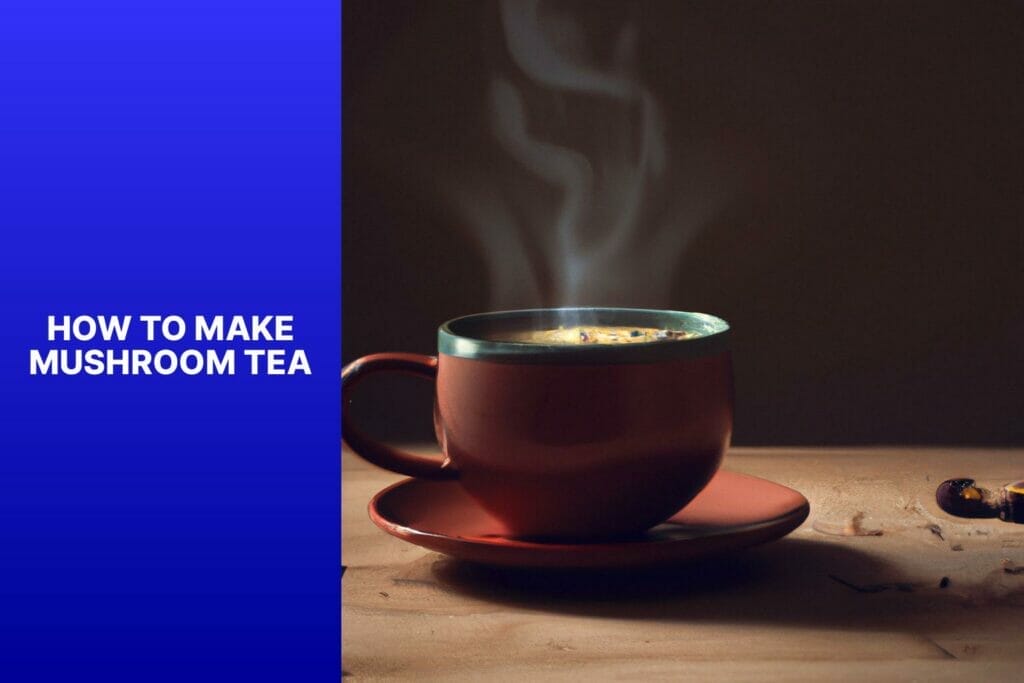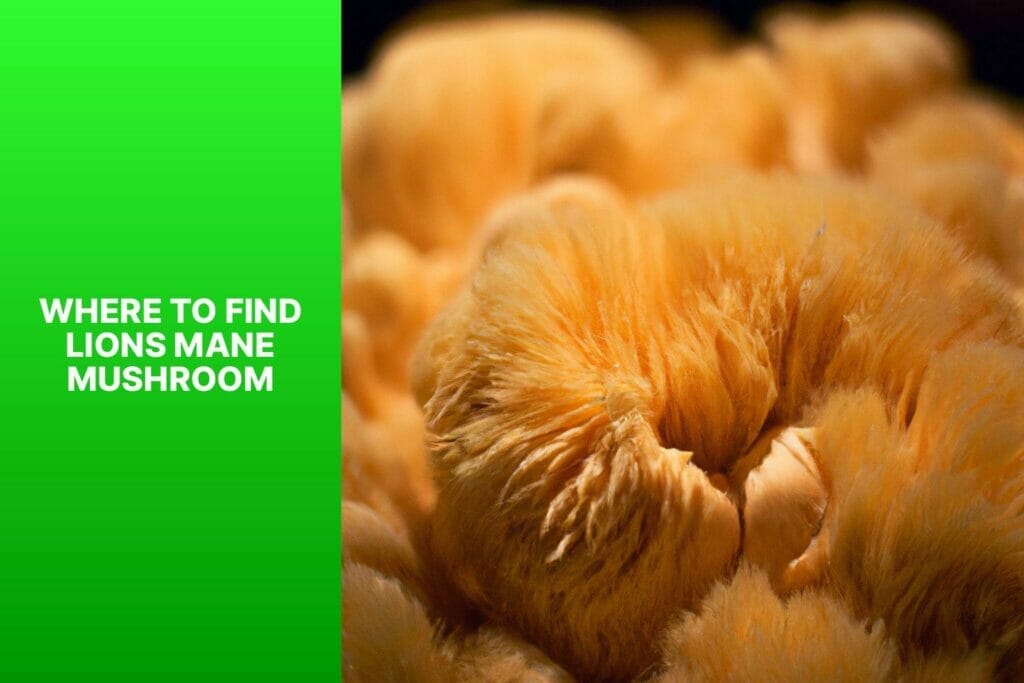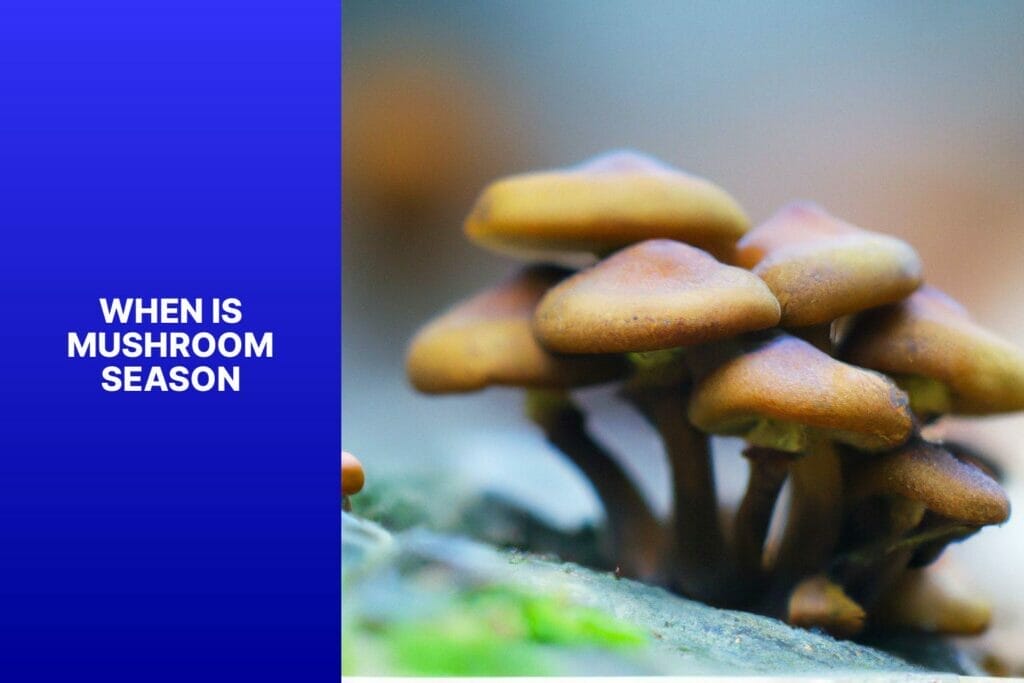Mushroom tea has gained popularity for its unique flavors and potential health benefits. This beverage infuses mushrooms in hot water, producing a flavorful and nutritious drink.
Different types of mushrooms can be used to create mushroom tea, each with its own set of health benefits. Some commonly used mushrooms in mushroom tea include Chaga Mushroom, Reishi Mushroom, and Lion’s Mane Mushroom.
The health benefits of mushroom tea are numerous. It can boost immunity, thanks to the presence of bioactive compounds that support the immune system. Mushroom tea also provides antioxidants, which help protect the body against oxidative stress and cellular damage.
Certain mushrooms used in the tea, such as Lion’s Mane and Reishi, have been found to support brain health and cognitive function.
Making mushroom tea is a relatively simple process. First, gather the necessary ingredients, including the mushroom of your choice and water. Choose the right mushroom based on the desired flavor and potential health benefits.
Prepare the mushroom by cleaning and slicing it into smaller pieces. Boil the water and add the mushroom slices, allowing them to steep. Strain the mixture and enjoy your homemade mushroom tea.
While mushroom tea can offer various health benefits, exercising precautions and being aware of potential side effects is important. Some individuals may experience allergic reactions to certain mushrooms.
Incorporating mushroom tea into your routine can be a delightful way to enjoy mushrooms’ flavors and potential benefits. It is always advisable to consult with a healthcare professional and exercise caution, especially when using mushrooms for their medicinal properties.
Key takeaway:
- Mushroom tea is a flavorful and beneficial beverage: Mushroom tea is an herbal tea that offers various health benefits, such as boosting immunity, providing antioxidants, and supporting brain health.
- Different mushrooms offer different benefits: Different types of mushrooms, including chaga, reishi, and lion’s mane, can be used to make mushroom tea, each with unique health benefits.
- Making mushroom tea requires simple steps: To make mushroom tea, gather the ingredients, choose the right mushroom, prepare the mushroom, boil water, steep the mushroom, strain, and enjoy. It’s important to be aware of precautions and potential side effects, such as allergic reactions, drug interactions, and digestive issues.
What Is Mushroom Tea?
Mushroom tea is a beverage made by steeping mushrooms in hot water. It is a popular choice for those looking to reap the potential health benefits of mushrooms.
The tea can be crafted using a variety of mushroom types, including reishi, chaga, lion’s mane, or shiitake. People believe consuming mushroom tea can enhance well-being and bolster the immune system. Whether you prefer hot or cold, mushroom tea is a versatile drink.
Although further research is needed to understand the benefits of mushroom tea fully, it is believed to contain bioactive compounds that can improve cognitive function. Nevertheless, it is crucial to remember that mushroom tea should not be used as a substitute for medical treatment.
It is advisable to consult with a healthcare professional before incorporating mushroom tea into your diet.
Types of Mushrooms Used in Mushroom Tea
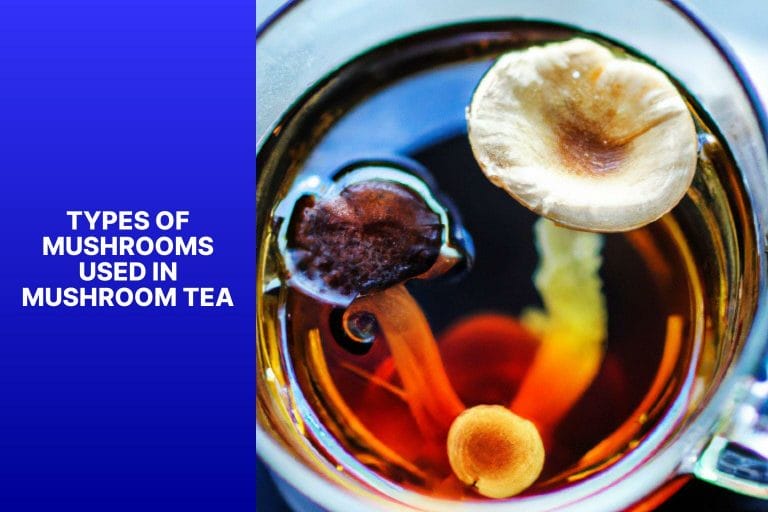
Photo Credits: True2Mushrooms.Com by Richard Mitchell
When it comes to making mushroom tea, knowledge about the different types of mushrooms used is essential. This section dives into the fascinating world of mushroom varieties that lend themselves well to brewing a delicious cup of tea.
We’ll explore each type and its unique properties, from the earthy and immune-boosting Chaga mushroom to the stress-relieving Reishi and cognitive-enhancing Lion’s Mane mushroom.
Get ready to discover the wonders hidden within your teapot!
Chaga Mushroom
Chaga mushroom is commonly used in mushroom tea for its health benefits and unique properties. It is rich in antioxidants, which protect the body against damage from free radicals. It also contains polysaccharides, which support the immune system and boost well-being.
To make Chaga mushroom tea, gather dried Chaga mushrooms and water. Use high-quality dried Chaga mushrooms for maximum benefits. Grind the mushrooms into a powder or chop them into small pieces.
Boil water and add the prepared Chaga mushrooms. Let the mixture steep for 20-30 minutes to extract the beneficial compounds. After steeping, strain the tea to remove any mushroom particles and enjoy the warm, earthy flavor of Chaga mushroom tea.
While Chaga mushroom tea is generally safe, be aware of potential allergies or drug interactions. Consult a healthcare professional before adding Chaga mushroom tea if you have underlying health conditions or take medications.
Adding Chaga mushroom tea to your wellness routine can enhance your overall health. Use high-quality ingredients and follow proper preparation methods for maximum benefits.
Reishi Mushroom
Reishi mushrooms, known as Ganoderma lucidum, have been used in traditional Chinese medicine for centuries. These incredible fungi offer a range of potential health benefits, including immune system enhancement, inflammation reduction, and overall well-being improvement.
Packed with antioxidants, reishi mushrooms serve as a shield against oxidative stress and free radical-induced damage. Numerous studies indicate that reishi mushrooms possess anti-cancer properties, hindering tumor growth and impeding the spread of cancer cells.
These mushrooms exhibit adaptogenic characteristics, aiding the body in coping with stress and promoting a sense of tranquility and relaxation.
Allow me to share a true story about Jane, who faced the challenge of a weakened immune system and battled frequent illnesses. Jane incorporated reishi mushroom tea into her daily routine to improve her health.
After just a few weeks, Jane experienced a remarkable enhancement in her well-being. Her immune system grew stronger, and she felt a boost in energy levels. Jane firmly believes that these positive changes resulted from the powerful effects of reishi mushroom tea.
As a result, she continues to savor a cup of reishi mushroom tea each day, making it an integral part of her wellness regimen.
Lion’s Mane Mushroom
Lion’s Mane Mushroom, also known as Hericium erinaceus, is a highly popular type of mushroom used to prepare mushroom tea. This mushroom species is indigenous to North America, Europe, and Asia and has been extensively employed in traditional medicine for centuries.
The most striking feature of the Lion’s Mane Mushroom is its distinct appearance, with long spines that closely resemble the majestic mane of a lion. Lion’s Mane Mushroom presents numerous potential health advantages when incorporated into mushroom tea. Notably, it effectively enhances cognitive function and supports optimal brain health.
Various studies have demonstrated that Lion’s Mane Mushroom is rich in compounds that stimulate the growth of specific brain cells, thereby improving memory retention and increasing focus.
This mushroom variant exhibits promising anti-inflammatory and antioxidant properties, crucial in safeguarding the body against oxidative stress while reducing inflammation.
Moreover, Lion’s Mane Mushroom offers robust support for the immune system, ultimately bolstering overall immunity. This can be attributed to the mushroom’s polysaccharides and other bioactive elements, which actively fortify the body’s immune response.
One can easily prepare mushroom tea by steeping either dried or fresh Lion’s Mane Mushroom in hot water to reap the benefits of Lion’s Mane Mushroom.
Knowing that some individuals may experience allergic reactions to this mushroom variety is important. As a precautionary measure, it is advisable to commence with a small quantity and closely monitor for potential adverse effects.
Health Benefits of Mushroom Tea
Unlock a world of wellness with mushroom tea! In this section, we’ll discover the incredible health benefits that mushroom tea has to offer.
From boosting immunity to providing a rich source of antioxidants and supporting brain health, each sub-section will delve into how this magical beverage can enhance your well-being.
So grab your cup and get ready to sip your way to vitality and vitality!
Boosts Immunity
Boosting immunity is one of the main benefits of mushroom tea. Mushroom tea contains compounds like beta-glucans and polysaccharides that enhance the immune system’s response to infections and diseases.
These compounds stimulate the production and activity of immune cells, strengthening the body’s defense against harmful pathogens.
Drinking mushroom tea regularly can increase the production and activity of natural killer cells, which is crucial in identifying and destroying cancer and virus-infected cells.
The antioxidants in mushroom tea, such as ergothioneine and selenium, also enhance the immune system by protecting immune cells from oxidative stress and damage.
Certain mushrooms used in mushroom tea, like chaga and reishi mushrooms, have adaptogenic properties that help modulate the immune system, maintaining a balanced immune function in response to different stressors.
It’s important to note that while mushroom tea can boost immunity, it should not be considered a standalone treatment for any specific health condition. Personalized advice and treatment options should be sought from a healthcare professional.
Provides Antioxidants
Mushroom tea provides antioxidants that protect the body from harmful free radicals. Here are key points about the benefits of antioxidant-rich mushroom tea:
– Certain mushrooms in mushroom tea, like chaga, reishi, and lion’s mane, have high antioxidant content.
– Antioxidants in mushroom tea neutralize free radicals, which can cause oxidative stress and damage cells.
– Regularly consuming antioxidants in mushroom tea may help reduce the risk of chronic diseases like heart disease, cancer, and neurodegenerative disorders.
– The antioxidants in mushroom tea also enhance immune function by preventing oxidative damage to immune cells.
When choosing mushrooms for their antioxidant content, opt for organic and sustainably sourced varieties for the highest quality and potency. It’s important to note that mushroom tea should not be considered a standalone treatment for any specific health condition.
Always consult with a healthcare professional before significantly changing your diet or lifestyle.
Supports Brain Health
Supporting brain health is one benefit of mushroom tea. It enhances cognitive function, protects against neurodegenerative diseases, improves memory and focus, reduces stress and anxiety, and boosts mood and mental well-being.
Mushroom tea contains compounds like lion’s mane mushroom, stimulating nerve growth factor production. These compounds help protect the brain from oxidative stress and inflammation and promote the growth of new brain cells.
Ancient civilizations recognized the benefits of mushrooms for brain health, and modern research continues to uncover their unique properties.
How to Make Mushroom Tea
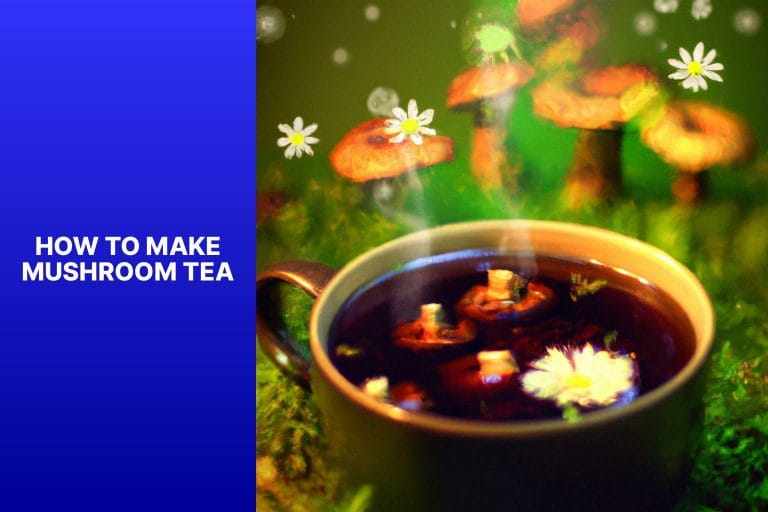
Photo Credits: True2Mushrooms.Com by Ronald Williams
Discover the art of brewing your mushroom tea in just a few simple steps. This section will guide you through selecting the perfect mushroom for the final sip.
Learn how to gather the freshest ingredients, choose the right variety of mushrooms, and expertly prepare and steep your tea. With a steaming cup, you’ll be ready to embrace mushroom tea’s unique flavors and potential health benefits.
Gather the Ingredients
Gathering all the necessary ingredients to achieve the perfect flavor and reap the health benefits is important when preparing mushroom tea. Start by selecting the mushrooms you wish to use, whether chaga, reishi, lion’s mane, or psilocybin mushrooms.
Ensure that these mushrooms are fresh, as this will enhance the taste and potency of your tea. It is best to avoid old or slimy mushrooms.
In addition to the mushrooms, you may gather other ingredients, such as ginger, lemon, or honey, to add flavor to your tea. To ensure a clean and pure taste, using filtered water when preparing the tea is recommended.
Remember, finding the right mushrooms and using fresh, high-quality ingredients is essential to creating a delightful and nourishing cup of mushroom tea. Gathering the ingredients is the first step towards a delightful mushroom tea experience.
Choose the Right Mushroom
To select the appropriate mushroom for mushroom tea, it’s important to consider the properties and effects of each type. Below is a table providing information on commonly utilized mushrooms:
| Mushroom | Properties | Effects |
| Chaga Mushroom | Rich in antioxidants, it boosts the immune system | Enhances well-being |
| Reishi Mushroom | Supports immune system, reduces stress | Promotes relaxation and mental clarity |
| Lion’s Mane Mushroom | Improves cognitive function, supports nerve health | Enhances mental focus and memory |
Choose the appropriate mushroom based on your specific needs and goals. Chaga or Reishi mushrooms are excellent options for enhancing the immune system.
Lion’s Mane mushroom is a suitable choice for improving cognitive function. If you are considering Psilocybin mushrooms, be aware of their psychoactive effects and use them responsibly and under guidance.
Fun fact: Mushrooms have been utilized for centuries in traditional medicinal practices due to their healing properties.
Prepare the Mushroom
To prepare the mushroom for mushroom tea, follow these steps:
- Gather the Ingredients: Gather the necessary ingredients for mushroom tea, including the mushroom of your choice, hot water, and any additional flavorings or sweeteners.
- Choose the Right Mushroom: Select the mushroom you want for your tea. Various types, such as Chaga, reishi, or lion’s mane, can be used. Each type has unique benefits and flavors.
- If using whole mushrooms, chop or break them into smaller pieces to release beneficial compounds. Using mushroom powder or extract, measure the desired amount according to the packaging instructions.
- Boil the Water: Bring a pot of water to a boil. The water needed depends on how much tea you want to make. As a general guideline, use one cup of water per serving.
- Steep the Mushroom: Add the prepared mushroom to the pot once boiling. Reduce the heat and let the mushroom simmer in the water for about 10-15 minutes. This allows the flavors and beneficial compounds to infuse into the water.
- Strain and Enjoy: Strain the tea to remove any mushroom pieces or residue after steeping. Pour the mushroom tea into a mug or teapot, enjoy it as is, or add flavorings or sweeteners if desired.
Historically, mushrooms have been used for medicinal purposes in various cultures worldwide. Mushroom tea preparation dates back centuries, with different mushrooms valued for their properties.
From boosting immunity to supporting brain health, mushroom tea is cherished for its potential health benefits. Today, it remains a popular beverage for those looking to naturally incorporate mushrooms into their daily routine.
Boil the Water
To boil the water for mushroom tea, follow these simple steps:
- Fill a pot with the desired amount of water, using a ratio of 1 cup per serving.
- Place the pot on high heat on the stovetop.
- Wait for the water to come to a rolling boil, which usually takes a few minutes.
- Once boiling, reduce the heat to medium-low to maintain a simmer.
- Cover the pot with a lid and let the water simmer for about 10 minutes. This will extract the flavors and nutrients from the mushrooms.
- After simmering, turn off the heat and remove the pot from the stove.
- Allow the water to cool for a few minutes before steeping the mushrooms.
- Continue with the next step in your tea-making process, such as adding the mushrooms to steep and infuse their flavors into the water.
Fun fact: Boiling water effectively kills microbes and pathogens present in the water, ensuring a safe and hygienic preparation of mushroom tea.
Steep the Mushroom
To make mushroom tea, follow these steps:
1. Prepare the mushroom by chopping, grinding, or slicing it. Then add it to a tea infuser or teapot.
2. Boil water in a kettle or on the stovetop. The amount of water will depend on how strong you want your tea.
3. Pour the boiling water over the mushroom in the teapot or tea infuser.
4. Allow the mushroom to steep in the hot water for 10-15 minutes. This extracts the beneficial compounds from the mushroom.
5. While steeping, cover the teapot or tea infuser to retain the heat and prevent the evaporation of volatile compounds.
6. After the steeping time, remove the mushroom from the tea infuser or strain the tea to separate the liquid from the mushroom pieces.
7. Pour the mushroom tea into a cup and enjoy while warm.
Steeping time can vary depending on the mushroom type and personal preferences. Some mushrooms may require longer steeping to release their beneficial properties fully.
True story:
My friend started incorporating mushroom tea into his daily routine. He would steeply mushroom slices in hot water for 15 minutes every morning. This ritual provided a warm and comforting beverage, boosting his energy and mental clarity throughout the day.
Steeping allowed him to extract all the beneficial compounds, and he enjoyed experimenting with different mushroom varieties for unique flavors and health benefits.
Strain and Enjoy
To strain and enjoy mushroom tea, follow these steps:
1. Boil water: Bring water to a boil. The amount needed depends on the recipe or the number of servings desired.
2. Choose the right mushroom: Select the mushroom type to use. Popular options include chaga, reishi, lion’s mane, and psilocybin mushrooms.
3. Prepare the mushroom: Clean the mushroom, removing dirt and debris. Chop or slice the mushroom for maximum flavor extraction.
4. Steep the mushroom: Add it to the pot of boiling water and let it steep. Steeping time varies based on the mushroom type and desired flavor strength.
5. Strain: After the desired steeping time, strain the tea to remove any mushroom particles or solids. Use a fine mesh strainer or cheesecloth.
6. Enjoy: Pour the strained mushroom tea into your favorite cup or mug. Drink it as is or add sweeteners or flavorings according to preference.
Remember to exercise caution when consuming mushroom tea, as certain mushrooms may have side effects or interact with medications.
Consult a healthcare professional if you have concerns.
Straining and enjoying mushroom tea offers a delightful way to experience these fungi’s unique flavors and potential health benefits.
Precautions and Potential Side Effects
Before sipping on a cup of mushroom tea, it’s crucial to be aware of the precautions and potential side effects. This section explores three key areas: Allergic Reactions, Drug Interactions, and Digestive Issues.
Stay tuned to learn about the risks of mushroom tea consumption and how they can affect your well-being. Don’t let surprises ruin your tea time experience – be prepared and informed!
Allergic Reactions
Allergic reactions can occur when consuming mushroom tea, although they are rare. Consider potential allergens and consult a healthcare professional before trying mushroom tea.
Some individuals may have allergies to certain mushrooms used in mushroom tea, such as Chaga, reishi, lion’s mane, or psilocybin mushrooms. Allergies can cause itching, hives, swelling, or more severe symptoms like difficulty breathing or anaphylaxis.
Start with a small amount of mushroom tea to minimize allergic reactions and monitor your body’s response. If any allergic symptoms occur, stop using immediately and seek medical attention.
Avoid mushroom tea altogether if you have a known allergy to mushrooms or other fungi. Individuals with a history of severe allergic reactions or asthma should exercise caution and consult a healthcare professional before trying mushroom tea.
Remember, everyone’s body reacts differently, so listen to your body and prioritize your health. If you suspect an allergic reaction, seek medical advice.
While mushroom tea has benefits, consider the potential for allergic reactions and take necessary precautions for a safe experience.
Drug Interactions
- Each person may react differently to mushroom tea. It’s important to be aware of potential drug interactions.
- Mushroom tea, especially made with medicinal mushrooms like reishi or chaga, may interact with certain medications such as blood thinners or antiplatelet drugs. They can also have blood-thinning properties.
- Some mushrooms used in mushroom tea, like lion’s mane, may have anticoagulant properties and could interact with blood-thinning medications.
Consult with a healthcare professional or pharmacist before consuming mushroom tea if you are taking any medications. They can provide personalized advice based on your specific medications and health condition.
While mushroom tea may offer various health benefits, it is crucial to use it safely and responsibly, especially regarding potential drug interactions.
Digestive Issues
- Mushroom tea may cause digestive issues in some individuals due to specific components in the mushrooms used. These digestive issues can include:
- Upset stomach: Mushroom tea can sometimes lead to discomfort, nausea, and vomiting.
- Indigestion: Some people may experience bloating, gas, and discomfort after consuming mushroom tea.
- Sensitivity: Individuals with a sensitive digestive system may be more prone to digestive issues when consuming mushroom tea.
- Precautions: If you have a history of digestive issues or are unsure about the effects of mushroom tea on your digestive system, it is advisable to start with a small amount and monitor your body’s response. Discontinue use if any digestive issues occur.
Some Facts About How To Make Mushroom Tea:
- ✅ To make mushroom tea, you need mushrooms, water, a pot, and a heat source. (Source: Bluntness)
- ✅ The process of making mushroom tea involves boiling water, grinding the mushrooms, steeping them in the water, and then straining the mixture before consuming. (Source: Bluntness)
